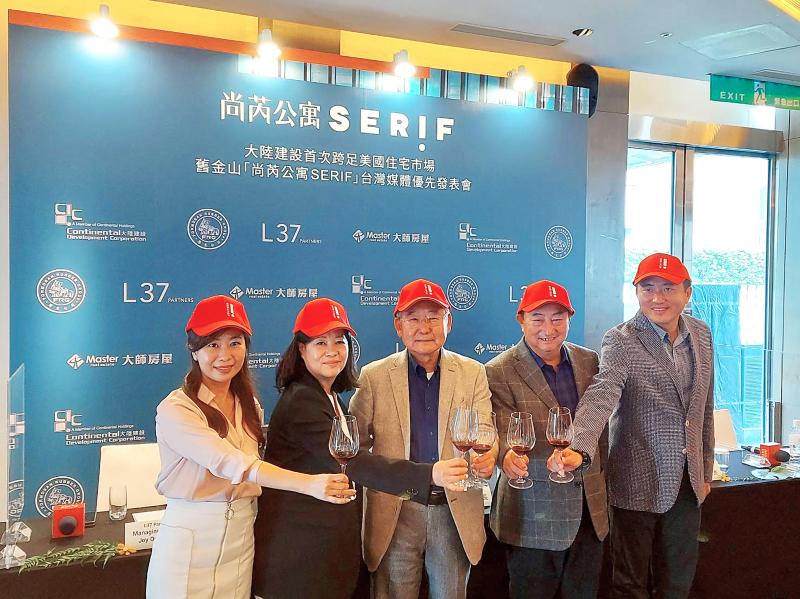Continental Development Corp (大陸建設) yesterday started selling small apartments in the heart of San Francisco, California, as the Taipei-based company seeks to expand at home and abroad.
The mixed-use complex, Serif (尚芮), on the intersection of Market Street and Turk Street is set to include 242 condominiums and an upscale hotel upon its completion in July, Continental Development chairman Christopher Chang (張良吉) told a news conference in Taipei.
The project — in which Continental Development owns a 54 percent stake, with Taoyuan-based Formosan Rubber Group (厚生) and US developer L37 Partners owning 24 percent and 11 percent respectively — would cost US$400 million to develop and follows a similar investment in Malaysia, Chang said.

Photo: Chen Yung-chi, Taipei Times
All parties are upbeat about the local property market that has benefited from its convenient location, near shopping areas, Silicon Valley and prestigious universities, he said.
All condo units measure between 11 and 35 ping (between 36.4m2 and 115.7m2), with mainstream units priced about US$1 million, L37 managing partner Joy Ou (歐慧瓊) said.
Demand remains strong for small apartments in the Bay Area, supported by the creation of 400,000 jobs in the past few years and a modest increase in building permits, at 60,000, Ou said.
Small apartments have been popular in San Francisco due to its dense population of affluent singles, she said, adding that the elegant modern design would strike a chord with the target customers.
The complex has 12 stories above ground and two basement floors.
Continental said it would ask Sydell Group to run the hotel, which would feature 236 luxury guest rooms, as it has been impressed by its diverse portfolio in Chicago, Los Angeles, Miami, New York, Washington and other major US and international cities.
The company said it would reserve 36 units for Taiwanese buyers, and 40 percent has already been sold to young wealthy professionals.
Taipei-based Master Real Estate Co (大師房屋), which is selling Serif units on behalf of Continental, said the supply shortage in the Bay Area would persist for 40 years because of development restrictions.
Buying interest is strong among rich Taiwanese, Master Real Estate chairman Simon Chen (陳建慶) said.

South Korea’s equity benchmark yesterday crossed a new milestone just a month after surpassing the once-unthinkable 5,000 mark as surging global memory demand powers the country’s biggest chipmakers. The KOSPI advanced as much as 2.6 percent to a record 6,123, with Samsung Electronics Co and SK Hynix Inc each gaining more than 2 percent. With the benchmark now up 45 percent this year, South Korea’s stock market capitalization has also moved past France’s, following last month’s overtaking of Germany’s. Long overlooked by foreign funds, despite being undervalued, South Korean stocks have now emerged as clear winners in the global market. The so-called “artificial intelligence

NEW IDENTITY: Known for its software, India has expanded into hardware, with its semiconductor industry growing from US$38bn in 2023 to US$45bn to US$50bn India on Saturday inaugurated its first semiconductor assembly and test facility, a milestone in the government’s push to reduce dependence on foreign chipmakers and stake a claim in a sector dominated by China. Indian Prime Minister Narendra Modi opened US firm Micron Technology Inc’s semiconductor assembly, test and packaging unit in his home state of Gujarat, hailing the “dawn of a new era” for India’s technology ambitions. “When young Indians look back in the future, they will see this decade as the turning point in our tech future,” Modi told the event, which was broadcast on his YouTube channel. The plant would convert

‘SEISMIC SHIFT’: The researcher forecast there would be about 1.1 billion mobile shipments this year, down from 1.26 billion the prior year and erasing years of gains The global smartphone market is expected to contract 12.9 percent this year due to the unprecedented memorychip shortage, marking “a crisis like no other,” researcher International Data Corp (IDC) said. The new forecast, a dramatic revision down from earlier estimates, gives the latest accounting of the ongoing memory crunch that is affecting every corner of the electronics industry. The demand for advanced memory to power artificial intelligence (AI) tasks has drained global supply until well into next year and jeopardizes the business model of many smartphone makers. IDC forecast about 1.1 billion mobile shipments this year, down from 1.26 billion the prior

People stand in a Pokemon store in Tokyo on Thursday. One of the world highest-grossing franchises is celebrated its 30th anniversary yesterday.